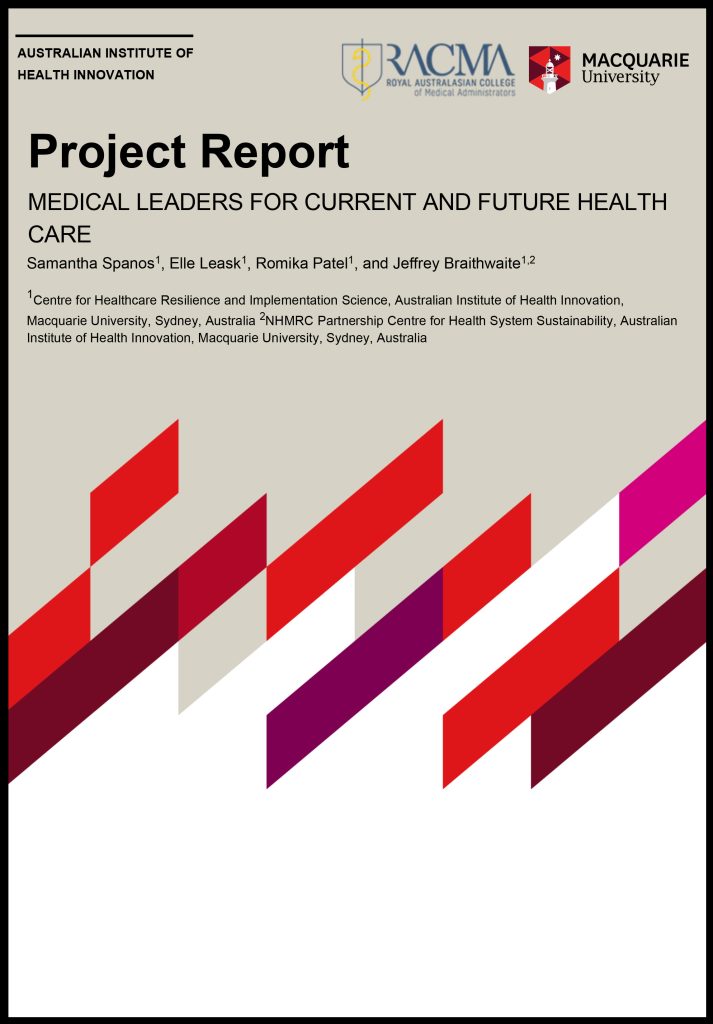The Royal Australasian College of Medical Administrators is proud to announce the release of the Medical Leaders for Current and Future Health Care report, researched and authored by the Australian Institute of Health Innovation, Macquarie University. The research team included Dr Samantha Spanos, Professor Jeffrey Braithwaite, Elle Leask, and Romika Patel
This comprehensive report offers critical insights into the evolving landscape of healthcare delivery and the pivotal role of Medical Leaders in shaping its future. Read on for statements from Helen Parsons CSC, RACMA President and Professor Jeffrey Braithwaite, Founding Director, Australian Institute of Health Innovation, Macquarie University, on the significance of the report.
Statement from Helen Parsons CSC, RACMA President

On behalf of the RACMA Board I am very pleased to officially release the Medical Leaders for Current and Future Health Care report researched and written by the Australian Institute of Health Innovation.
This key piece of research provides great insight into how healthcare and services will be provided in the future. It identifies trends influencing Australia’s healthcare system and their effect on care and services and explores the implications of future health systems for Medical Leaders, including the attributes and characteristics required for future care and services.
It highlights the diverse roles of Medical Leaders, which are deeply enmeshed in a complex and ever-changing healthcare system. RACMA has over 1500 Members across Australia, Aotearoa New Zealand, and Hong Kong working in the Public Service Sector, Private Health, Primary Health Care, Medical Insurance, Tertiary Sector, and Military. Some of the pivotal roles carried out by our Members include Chief Executives, Chief Medical Officers, Medical Directors, Heads of Departments, Regulatory and Quality Assurance Body Executives and Chairs of key industry and research committees.
Our Members strive to lead for change and ensure the delivery of safe and quality healthcare for all. Out of all the healthcare fraternity it is RACMA Members who can provide a whole of system outlook and understanding through:
- Leading and advising on the most effective configuration and delivery of clinical services to meet the needs of the population served
- Bridging the interface between management and clinicians in complex health systems
- Leading the engagement, deployment, and accountability of the medical workforce
- Working across multi-disciplinary teams to expand scopes of practice and encourage work practice reform
- Leading the continual improvement of quality and safety through the timely identification and mitigation of clinical risk
- Advocating for service enhancements to optimise consumer access, experience, and outcomes
- Implementing digital health applications, analytics, and reporting systems that effectively capture clinical data and communicate comparative performance, risk, and opportunities
- Ensuring appropriate legal and insurer engagement to protect organisations’ regulatory and litigation risks
- Providing oversight and promotion of clinical research and innovation
It is critical all health care systems and medical professionals across Australasia are supported by the highest standard of qualified medical leaders to enhance the health outcomes of patients, healthcare services, and the communities they serve.
RACMA is the only Specialist Medical College to provide specialist education, leadership, advice, and expertise in Medical Leadership and Management that promotes the delivery of high-quality, safe healthcare for all.
The report will help inform future College activities and demonstrate to government and other stakeholders the benefits and importance of RACMA’s specialist training and education which prepares medical leaders for the ambiguity of an uncertain future to keep healthcare moving forward.
Statement from Professor Jeffrey Braithwaite, Founding Director, Australian Institute of Health Innovation, Macquarie University

The Medical Leaders for Current and Future Health Care report investigates and illustrates the crucial role that medical leaders play in health care, and the growing breadth of their work and influence across health systems. It demonstrates that as healthcare delivery becomes more complex, there will be an increasing need for medical leaders’ expertise, which has implications for their existing scope of practice and education.
Through synthesizing over 200 literature sources and the perspectives of 150 medical leaders across the country, the report describes key health system trends that both challenge and empower change and identifies action areas and strategies for medical leaders to pioneer in driving health system improvement. Health systems will need to prioritise sustainability, adopt genomics technologies into routine care, cope with changing demographics and disease profiles, carefully assess and implement artificial intelligence and create new models of care that are adaptable to current and future pressures. Meeting the demands of these trends requires integrated, value-based, patient-centred care that is driven by data and sound policies and standards. Systems must be designed with the principles of equity and diversity, a greater focus on prevention and accessibility, and a fit-for-purpose workforce that is well-nurtured and supported to actualise system changes.
The future of healthcare demands medical leaders with a unique skillset. They must be innovation champions, leveraging digital health and artificial intelligence to improve care, understanding system complexity and the need for adaptation. They must promote resilience through embracing uncertainty, learning from successes, and bolstering communication, trust, and interpersonal relations. They must lead collaboratively, foster multidisciplinary teamwork, and build capacity in emerging leaders to drive sustainable quality improvement. Finally, medical leaders must advocate for marginalised groups and engage with communities to enable care and services that are equitable and person-centred. These combined skills and knowledge will empower medical leaders to navigate the complexities of modern healthcare and shape a healthier future.


